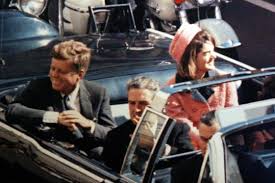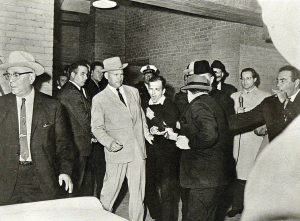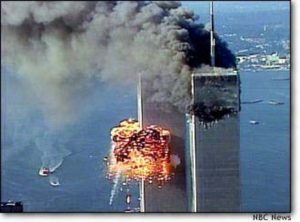By Suzanne Sparrow Watson
 Inflection points – events that not only change the course of history but our collective psyche as well. For many of us the first such event was the Kennedy assassination. Prior to November 22, 1963, we were a nation energized by a young President with fresh ideas and plans – plans that were to be carried out by those “born of a new generation”. When JFK was cut down it was shocking and unnerving. And, one could argue, changed who we are. There is a much-quoted conversation that took place after the assassination between journalist Mary McGrory and Daniel Patrick Moynihan, then assistant secretary of labor. She lamented, “We’ll never laugh again.” He replied: “Mary, we’ll laugh again. It’s just that we’ll never be young again.” Many hopes and dreams died that day, as well as our collective feeling of security and our way of life. As some sociologists have noted, November 22, 1963 was the end of the Fifties.
Inflection points – events that not only change the course of history but our collective psyche as well. For many of us the first such event was the Kennedy assassination. Prior to November 22, 1963, we were a nation energized by a young President with fresh ideas and plans – plans that were to be carried out by those “born of a new generation”. When JFK was cut down it was shocking and unnerving. And, one could argue, changed who we are. There is a much-quoted conversation that took place after the assassination between journalist Mary McGrory and Daniel Patrick Moynihan, then assistant secretary of labor. She lamented, “We’ll never laugh again.” He replied: “Mary, we’ll laugh again. It’s just that we’ll never be young again.” Many hopes and dreams died that day, as well as our collective feeling of security and our way of life. As some sociologists have noted, November 22, 1963 was the end of the Fifties.
 The assassination changed us in ways we could not have predicted at the time. After that, Americans increasingly distrusted the Federal government (particularly after publication of the Warren Report) and yet, ironically, it also precipitated the largest expansion of government into our everyday lives. We became embroiled in a war that many argue Kennedy would not have supported and our culture was flush with sex, drugs and a whole lot of anger. Of course, there were good changes as well – civil rights and the women’s movement to name two – but certainly the innocence of the prior decade was gone forever. It also marked the rise of television over newspapers. Everyone was glued to black and white screens, watching events unfold for three days. And why not? It was compelling and the only way to stay abreast of changing events. For me, I remember watching Lee Harvey Oswald being escorted down that fateful corridor in the Dallas police station when Jack Ruby shot him. The experience of seeing someone killed in real time was jarring and disturbing. Millions of people experienced that same shock. Coupled with the assassination, how could we not be affected going forward?
The assassination changed us in ways we could not have predicted at the time. After that, Americans increasingly distrusted the Federal government (particularly after publication of the Warren Report) and yet, ironically, it also precipitated the largest expansion of government into our everyday lives. We became embroiled in a war that many argue Kennedy would not have supported and our culture was flush with sex, drugs and a whole lot of anger. Of course, there were good changes as well – civil rights and the women’s movement to name two – but certainly the innocence of the prior decade was gone forever. It also marked the rise of television over newspapers. Everyone was glued to black and white screens, watching events unfold for three days. And why not? It was compelling and the only way to stay abreast of changing events. For me, I remember watching Lee Harvey Oswald being escorted down that fateful corridor in the Dallas police station when Jack Ruby shot him. The experience of seeing someone killed in real time was jarring and disturbing. Millions of people experienced that same shock. Coupled with the assassination, how could we not be affected going forward?
 The next time I saw anyone murdered was sixteen years ago today – September 11, 2001. I flipped on CNBC that morning while getting ready for work. The first plane had already hit Tower One and the hosts were speculating that it was a freak accident. They mused about whether it would have an affect on the stock market since so many trading firms were in that building. Then the unimaginable happened – the second plane hit. I watched it in horror; this time it wasn’t one person I saw killed, but thousands. Thanks to the 24 hour news cycle we were all witness to explosions and fire and falling bodies over and over again for weeks. I’m not sure we yet fully understand the toll that it took on us. Surely our national mindset was altered after watching all of the carnage and grief. A grief that I believe is still evident after all these years.
The next time I saw anyone murdered was sixteen years ago today – September 11, 2001. I flipped on CNBC that morning while getting ready for work. The first plane had already hit Tower One and the hosts were speculating that it was a freak accident. They mused about whether it would have an affect on the stock market since so many trading firms were in that building. Then the unimaginable happened – the second plane hit. I watched it in horror; this time it wasn’t one person I saw killed, but thousands. Thanks to the 24 hour news cycle we were all witness to explosions and fire and falling bodies over and over again for weeks. I’m not sure we yet fully understand the toll that it took on us. Surely our national mindset was altered after watching all of the carnage and grief. A grief that I believe is still evident after all these years.
To this day many of us tear up when recalling the image of the Twin Towers collapsing. It remains hard to think about the people who perished that day – people who left home for work on a bright, blue-sky Tuesday morning and never returned. The very notion of that was – is – frightening and causes us, once again, to question how secure we really are. The fear of an imminent terror attack began impacting our everyday lives that day. Suddenly we had to remove our shoes at the airport and limit the amount of shampoo we carry on a plane. Socially, it brought on a lot of change too. For the first few months after 9/11 it seemed we were able to put our differences aside, but that fraternity soon dissipated and has now devolved to a point where divisiveness rules the day . In many ways, it has been the 60’s all over again with an extra dose of anger thrown in.
Which brings me to the unintended consequences of 9/11. At some level we live with fear on a daily basis – fear that it could happen again to us or someone we love. We witness repeated terrorist attacks carried out all over the world that target ordinary people doing ordinary things. I believe that the discord in our society is, in part, a manifestation of that fear. I hope at some point we can recapture the unity we had in the aftermath of 9/11 and once again pull together. Hurricane Harvey, as devastating and heart-breaking as it’s been, has shown me that people really can come together when fellow citizens are in need. Sandra Bullock put it best when she Tweeted: “There are no politics in 8 feet of water. There are human beings in 8 feet of water.” Amen. Maybe this is a new beginning. A new inflection point that causes us to remember that more often than not, most of the time we’re all just human beings in 8 feet of water.